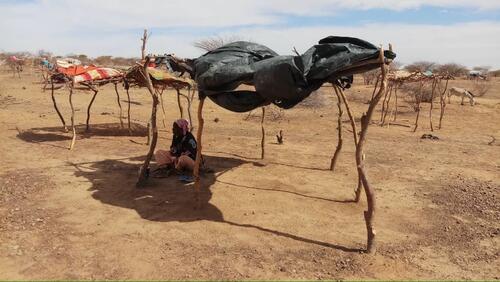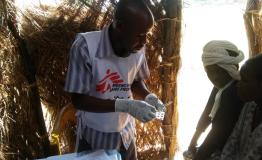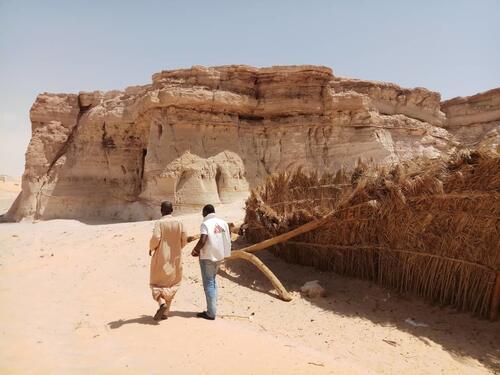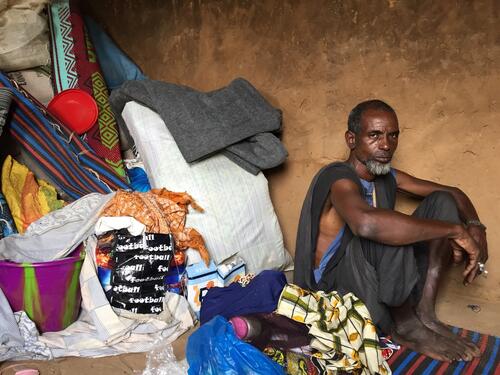- An upsurge in threats from armed groups operating between the borders of Mali and Niger has triggered population movements in the Nigerien region of Tillabéry
- The displaced people have been staying in makeshift shelters, without access to clean water or sanitation facilities
- MSF is providing relief items, water and sanitation activities, and medical and mental health aid, but urgent needs in food and protection are largely unmet
Recently, an upsurge in threats from armed groups operating between the borders of Mali and Niger has caused a new wave of displacement. More than 8,000 people have been forced to settle in improvised camps around the village of Kongokiré, Tillabéry region, Niger, where they live in appalling conditions, in a zone which is also considered as insecure. Médecins Sans Frontières (MSF) has intervened with essential relief items, medical and mental health aid, and water and sanitation activities to cover the most pressing needs.
Many of the displaced in Kongokiré have already been forced to flee several times. We can see signs of trauma in their behaviour.Innocent Kunywana, MSF rapid emergency response team coordinator
The two informal sites currently host about 10,000 people: Malian refugees who have fled due to mounting insecurity, and internally displaced Nigeriens, most of whom had already been displaced at least twice by persistent threats from armed groups and by difficult living conditions.
The displaced have reached Kongokiré, in western Niger, with little or nothing. They stay and sleep in makeshift shelters made of sticks, straw, plastic bags and cloth, and lack access to safe water and sanitation.

To respond to this alarming situation, MSF has distributed 1,173 non-food item kits which include mats, blankets, mosquito nets, tarpaulin, jerrycans, soap and basic cooking utensils, targeting 8,211 internally displaced people (IDP) and refugees. Our teams are also building latrines to improve the sanitation conditions in the area.
We are running mobile clinics directly in the camps to provide vulnerable people – who have had difficult access to preventive healthcare for years – with basic medical aid. In addition, we are supporting a nearby health post to facilitate access to care for both displaced and local populations. This assistance is accompanied by mental health consultations.
One of the main risks currently faced in the camps is lack of foodInnocent Kunywana, MSF rapid emergency response team coordinator
“Many of the displaced in Kongokiré have already been forced to flee several times. We can see signs of trauma in their behaviours, and hear them in their words,” says Innocent Kunywana, coordinator of the MSF rapid emergency response team that is providing aid in the camps. “Many refugees and IDPs say that they cannot envision a return. The situation in the region keeps deteriorating, and as long as there is insecurity, there will be no guarantee of safe return for these people.”
“One of the main risks currently faced in the camps is lack of food,” says Innocent Kunywana. “If the displacement continues for a while – which is what we expect to happen – this may generate tensions between local populations and the displaced, and even fuel conflicts within the camps.”
Mobilisation of other organisations is critical to covering the unmet needs in food and protection. So far, the humanitarian presence in Tillabéry, and especially in the zones where insecurity is very high, has been insufficient.
MSF is worried that the situation in the region may spiral, as Tillabéry is affected both by the conflict in Mali and the surge of armed groups in Burkina Faso, and these root causes of insecurity and displacement will likely persist.
In addition to emergency interventions, in Tillabéry MSF supports two health centres and 6 health posts in the districts of Banibangou and Ayorou. Before the arrival of MSF, medical activities in these zones had been limited due to insecurity. In collaboration with the Ministry of Health, our teams facilitate access to healthcare to local and displaced populations. In January, MSF treated 4,789 patients, conducted 427 antenatal consultations and vaccinated 687 children under two.






